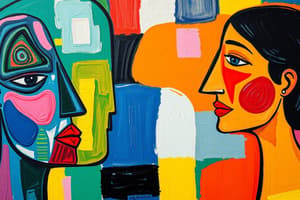Podcast
Questions and Answers
What does the Traditional Self System refer to?
What does the Traditional Self System refer to?
- Success relative to aspirations (correct)
- Culturally determined self-views
- Interaction with others
- Developing emotions in infants
What is the Looking Glass Self?
What is the Looking Glass Self?
Self representations constructed from interactions with others.
What does the Cultural Self System focus on?
What does the Cultural Self System focus on?
Culturally determined differences in self-viewing preferences.
The Infant Self System begins with body permanence and separation from ______.
The Infant Self System begins with body permanence and separation from ______.
By age two, children can engage in joint reference and recognize themselves in the mirror.
By age two, children can engage in joint reference and recognize themselves in the mirror.
What initiates Behavior Regulation?
What initiates Behavior Regulation?
How do parents contribute to socializing infants?
How do parents contribute to socializing infants?
Match the dimensions of parenting with their descriptions:
Match the dimensions of parenting with their descriptions:
What are the potential effects of aggressive punishment?
What are the potential effects of aggressive punishment?
What is the consequence of corporal punishment?
What is the consequence of corporal punishment?
Flashcards are hidden until you start studying
Study Notes
Traditional Self System
- Valence of personal attributes is linked to relative successes and aspirations.
- Successes experienced shape self-perception and self-worth.
Looking Glass Self
- Self-image is shaped through interactions with others.
- The concept, introduced by Cooley, indicates individuals build a self that reflects perceived external views.
Cultural Self System
- Self-perception is influenced by cultural norms and values.
- Mead emphasized differences in how individuals perceive themselves based on their cultural background.
Infant Self System
- Initial awareness of self relies on body permanence and differentiation from others.
- Around six months, infants start recognizing their individuality separate from caregivers.
Toddler Self System
- By age two, children show early self-awareness through mirror recognition and joint reference.
- Self-esteem starts developing with self-recognition, becoming clearer by preschool age.
Behavior Regulation
- Begins in the second year with the emergence of symbolic thought.
- Self-conscious emotions develop as children learn rules, leading to gradual self-regulation.
Socializing Infants
- Parenting practices shift to foster independence and social skills.
- Effective caregiving lays the foundation for safety and appropriate behavior in social contexts.
Dimensions of Parenting
- Warmth encompasses affection, acceptance, and interest in a child's life.
- Parental control refers to the enforcement of behavioral standards and expectations.
Parent Control
- Aggressive punishment has immediate effects but may cause long-term issues.
- Love withdrawal creates anxiety and hampers self-regulation.
- Induction involves explanations that foster longer-term self-regulation over time.
Corporal Punishment
- Involves inflicting physical pain to control behavior.
- Linked to increased externalizing behaviors and mental health issues, observable across different cultures.
Studying That Suits You
Use AI to generate personalized quizzes and flashcards to suit your learning preferences.




